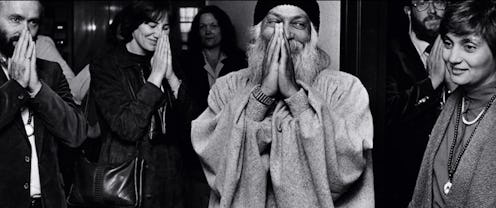
Premiering March 16, the Netflix docuseries Wild Wild Country details the conflict between the people of Antelope, Oregon and the followers of spiritual leader Bhagwan Shree Rajneesh who decided to build a community on property nearby. Though the series shows that many issues were political, some townspeople were also offended by the group's manner of worship. Though it wasn't what the Ranjeeshees believed that necessarily caused conflict, it may have been more of a matter of how they practiced those beliefs.
The events of Wild Wild Country would be unbelievable if they weren't true. What begins as a conflict between a religious settlement and local townsfolk explodes into alleged election fraud, assassination attempts, and poisoning. Before the citizens of Ranjeeshpuram were the subject of national note, however, they were simply a collection of people who were following the spiritual guidance of one man. They dressed in bright shades of red and orange, according to the series, which caused them to stick out amongst the townsfolk of Antelope. But one of their most intrusive qualities seemed to be the noise emanating from the compound. One of the tenets of Rajneesh's teaching was sexual freedom, and as multiple Antelope citizens share in interviews seen in Wild Wild Country, the sounds of sex on the Ranjeesh compound would echo far and wide.
Encyclopedia Britannica explains Ranjeesh's view of religion as something that is specific and individual, thus it's difficult to explain his influence in just a synopsis. Ranjeeshism can therefore be seen as an attempt at making that lack of an strict belief system, filtered through Ranjeesh's leadership, into a belief system of its own. According to his New York Times obituary, Rajneesh was a teacher before he began his ashram and reframed himself as a spiritual leader.
One of the defining aspects of Ranjeeshism is that it combined religion with material wealth and earthly pleasures. While the Christian community of Antelope mostly made modest livings, the followers of Ranjeesh found joy in indulgence. Ranjeesh himself was known nationally as the "Rolls-Royce Guru," as reported by The Wire, in reference to his fleet of luxury vehicles which he would drive down a long road, cheered by his followers.
If he wasn't being called the "Rolls-Royce Guru," chances are Ranjeesh was being referred to as the "sex guru," as he is several times in Wild WIld Country. His promotion of free love became a defining tenant of Ranjeeshism. Along with indulging in free love outside of marriage or monogamy, The New York Times reported that there had been accounts of "sessions" at his ashram in India "in which participants were beaten severely and encouraged to act out their most violent fantasies, including rape, to cleanse themselves of aggression." Reportedly, those practices were eradicated before the move to Oregon. But Ranjeesh's belief in "living fully" extended to both self-actualization as and physical activity.
Ranjeesh himself renounced some tenets of the religion only a few years after starting it, according to The Los Angeles Times, including the Book of Rajneeshism. He died in 1990 at the age of 58. But Ranjeesh's teachings are still studied and celebrated in 2018. After the fall of Ranjeeshpuram in Oregon, Ranjeesh changed his name to Osho. And his beliefs became the basis for OSHO International. The group has over 2 million followers on Facebook.
Whether you are just interested in reading Osho's spiritual readings or you are hoping to visit the OSHO International Meditation Resort in Pune, India, OSHO International has resources that have kept the teachings of Ranjeesh alive long after his death. Ranjeeshism and Ranjeeshpuram may be gone, the teachings that served as the basis for them have evolved.
If you or someone you know has been sexually assaulted, call the National Sexual Assault Telephone Hotline at 800-656-HOPE (4673) or visit online.rainn.org.